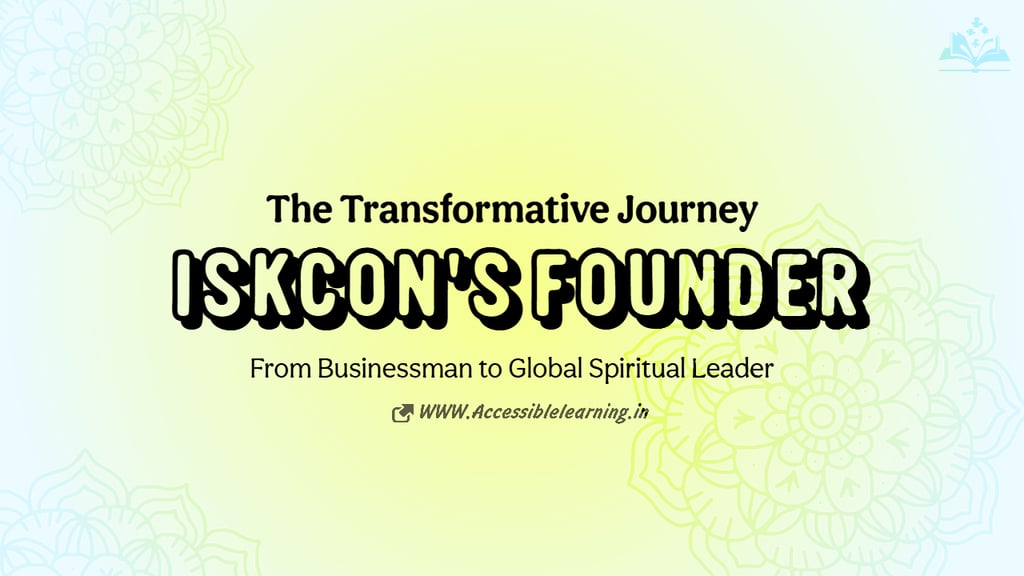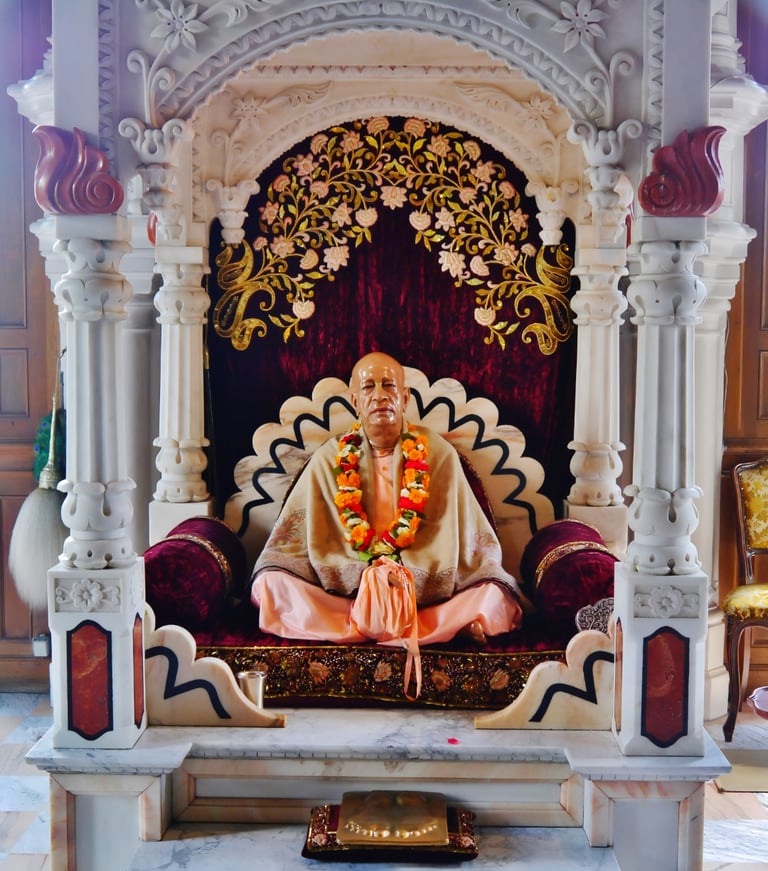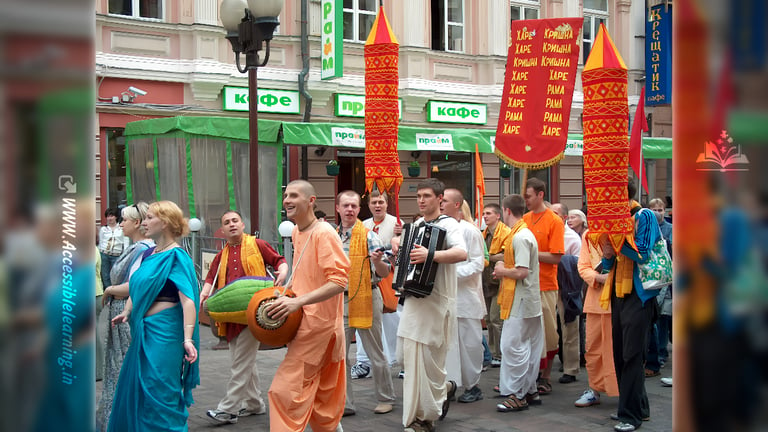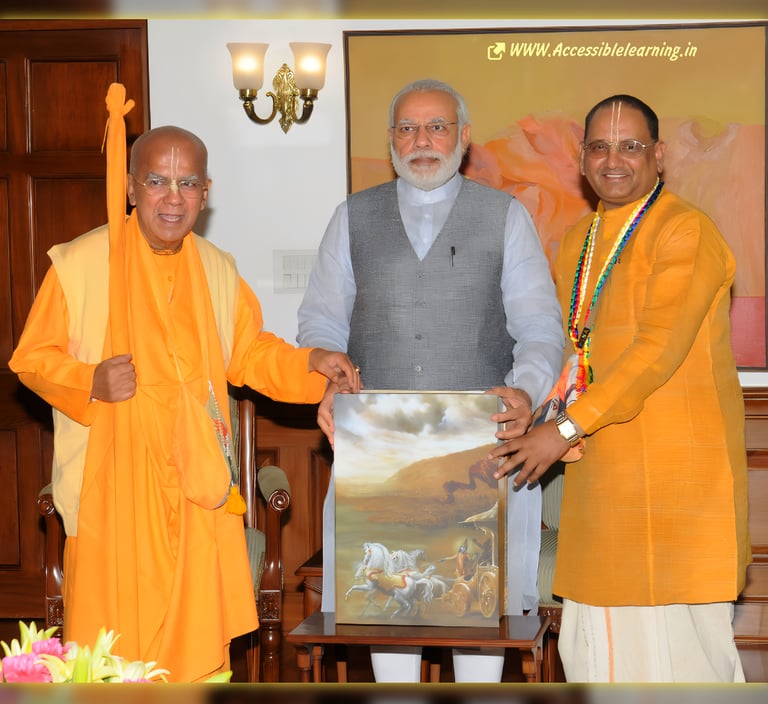
A. C. Bhaktivedanta Swami Prabhupada: The Extraordinary Journey of ISKCON's Founder
Discover the remarkable life of the 70-year-old spiritual teacher who traveled from India to America with just $7 and created a global movement that transformed Western spirituality. This comprehensive profile explores Prabhupada's early struggles, his visionary leadership, and the enduring legacy of his work in bringing Krishna consciousness to the world.
CULTURE/TRADITIONEVENT/SPECIALEDUCATION/KNOWLEDGEINDIA/BHARAT
Sachin K Chaurasiya
4/6/202511 min read


In the spiritual landscape of the 20th century, few figures have had as profound an impact as A. C. Bhaktivedanta Swami Prabhupada. At the age of 69, when most people contemplate retirement, Prabhupada embarked on a remarkable journey that would transform the spiritual lives of countless individuals across the globe. The founder of the International Society for Krishna Consciousness (ISKCON), commonly known as the Hare Krishna movement, Prabhupada's unwavering dedication to sharing the teachings of Bhakti yoga and Krishna consciousness has left an indelible mark on Western spirituality.
Early Life and Spiritual Foundation
Born Abhay Charan De on September 1, 1896, in Calcutta (now Kolkata), India, Prabhupada grew up in a devout Vaishnava family. His parents instilled in him a deep reverence for Krishna Ji from an early age. As a child, he would often imitate religious festivals and showed an innate inclination toward spiritual matters.
Interestingly, his father, Gour Mohan De, never wanted his son to enter the British educational system, fearing it would make him a materialist. Instead, he wanted Abhay to learn the ancient Vedic knowledge. However, recognizing the practical needs of the time, he eventually allowed his son to attend Scottish Churches' College in Calcutta, where Prabhupada studied English, philosophy, and economics.
During his college years, Prabhupada became involved in India's independence movement and was a follower of Mahatma Gandhi's civil disobedience campaigns. He even refused to accept his degree from the British-run university as a protest against colonial rule—an early indication of his principled nature and willingness to sacrifice personal gain for his convictions.
The Pivotal Meeting and Spiritual Calling
Though he was an intelligent student with promising career prospects, his life took a decisive turn in 1922 when he met his spiritual master, Bhaktisiddhanta Sarasvati Thakura, a prominent Vaishnava scholar and the founder of the Gaudiya Math.
This meeting was arranged by a friend, and initially, Prabhupada went reluctantly. Being a nationalist at the time, he questioned why they should be concerned with spiritual matters when India was under foreign domination. Bhaktisiddhanta Sarasvati's response profoundly impacted him: "The message of Chaitanya Ji is for the entire world. Political independence is meaningless without spiritual independence."
During this first meeting, Bhaktisiddhanta Sarasvati requested young Abhay to spread the teachings of Lord Krishna to the English-speaking world. This pivotal moment planted the seed for what would later become Prabhupada's life mission.


From Businessman to Spiritual Leader
For many years, Prabhupada led a dual life as a family man and businessman while nurturing his spiritual practice. He married in 1918 and had five children. To support his family, he managed a pharmaceutical business, which provided him with a comfortable living.
What many don't realize is that Prabhupada was a capable entrepreneur who formulated and marketed his own pharmaceuticals. His specialty product, "Prabhupad's Dâl," enjoyed modest success in the market. This business acumen would later prove invaluable in establishing and expanding ISKCON as a global organization.
However, his spiritual calling remained ever-present. In 1944, during World War II, he began publishing "Back to Godhead," an English-language magazine focused on Krishna consciousness teachings. Working single-handedly—writing, editing, printing, and distributing copies himself—Prabhupada demonstrated the tireless dedication that would characterize his later missionary work.
A little-known fact is that Prabhupada once wrote a letter to Mahatma Gandhi, requesting him to incorporate Krishna consciousness teachings into the independence movement. Though Gandhi expressed interest, their meeting never materialized due to Gandhi's assassination in 1948.
The Challenging Transition
In 1950, at the age of 54, Prabhupada embraced vanaprastha (retired life) by stepping away from family responsibilities to devote himself more fully to spiritual pursuits. This period was marked by significant hardship and testing of his resolve.
When he moved to the holy city of Vrindavan, he lived in the historic medieval temple of Radha-Damodara, where he stayed in a small room with minimal amenities. Visitors to this room today are often astonished by its simplicity—a humble space where he translated the first three volumes of the Srimad-Bhagavatam using a typewriter perched on a small desk.
In 1959, he took sannyasa, the renounced order of life in Hinduism, receiving the title "Bhaktivedanta Swami." The ceremony took place in Mathura, and his spiritual name was given to indicate his mastery of bhakti and Vedanta philosophy.


The Journey to America
Perhaps the most extraordinary chapter of Prabhupada's life began in 1965. At 69 years old, with just 40 rupees (approximately $7) in his possession, a trunk of his Bhagavata translations, and unwavering faith, he boarded the cargo ship Jaladuta bound for America.
The journey was perilous. Prabhupada suffered two heart attacks during the 35-day voyage across the Atlantic. During this time, he wrote a beautiful prayer called "Markine Bhagavata-Dharma," asking Krishna Ji for strength and guidance in his mission. The poem reveals his deep humility and determination despite overwhelming obstacles.
What's remarkable is that the captain of the Jaladuta later reported that the turbulent Atlantic Ocean became mysteriously calm during their journey, something he had never experienced before. He attributed this to the presence of the holy man on board.
Upon arrival in Boston Harbor, Prabhupada wrote in his diary, "My dear Krishna Ji, I am sure that when this transcendental message penetrates their hearts, they will certainly feel gladdened and thus become liberated from all unhappy conditions of life." His prophetic words would come true in ways he could hardly imagine at that moment.
Early Struggles in America
Prabhupada's early days in New York were marked by tremendous hardship. He stayed in various locations, including an apartment in the Bowery district known for its homeless population and struggling artists. During his first winter in New York, he endured extreme cold, which aggravated his health problems.
An intriguing detail from this period was his interaction with Dr. Ramamurti Mishra, who offered him accommodation at his Ananda Ashram. However, Prabhupada declined because meat was allowed there, demonstrating his strict adherence to Vaishnava principles even during times of great personal difficulty.
While living at 26 Second Avenue in New York's Lower East Side, Prabhupada survived on donations and by selling his books. He cooked for himself on a small hotplate and washed his clothes in the sink. Despite these austere conditions, he always maintained immaculate personal hygiene and dignity—qualities that impressed the young Americans who began to visit him.
Cultural Bridge-Building
Prabhupada's breakthrough came when he established a storefront temple on New York's Lower East Side in 1966. This modest location became the first temple of what would eventually grow into ISKCON. Young Americans, many of whom were part of the counterculture movement seeking alternative spirituality, were drawn to Prabhupada's authentic teachings and compassionate nature.
An important aspect often overlooked is how Prabhupada brilliantly adapted ancient Vedic practices for Western practitioners without compromising core principles. For instance, he simplified complex Sanskrit mantras for his Western disciples but insisted on the spiritual essence remaining intact. He allowed some flexibility in dress and customs while maintaining strict standards for behavior and practice.
His approach to music was especially innovative. Traditional kirtan in India followed certain ragas and musical styles, but Prabhupada encouraged his Western followers to incorporate familiar musical instruments and melodies while chanting Krishna's names. This fusion approach helped make kirtan accessible and appealing to Westerners, contributing significantly to the movement's growth.

The Mantra Rock Concert
One of the most fascinating events in ISKCON's early history was the "Mantra Rock Dance" concert held at the Avalon Ballroom in San Francisco on January 29, 1967. This groundbreaking event featured Prabhupada alongside popular rock bands of the era, including the Grateful Dead and Big Brother and the Holding Company with Janis Joplin.
The poster for the event proclaimed it as "An evening of consciousness expansion through sound vibration," perfectly bridging counterculture language with Vedic concepts. During the concert, Prabhupada led thousands of young Americans in chanting the Hare Krishna mantra—a remarkable cultural moment that helped catapult Krishna consciousness into mainstream awareness.
Allen Ginsberg, who participated in the event, later remarked that Prabhupada had accomplished something extraordinary: he had successfully transplanted an ancient spiritual tradition into the heart of modern Western youth culture.
Global Expansion and Remarkable Growth
From this humble beginning, ISKCON expanded remarkably under Prabhupada's guidance:
By 1977, he had established 108 temples across six continents
Initiated over 5,000 disciples worldwide
Created farm communities and vegetarian restaurants
Founded Bhaktivedanta Book Trust, now the world's largest publisher of books on Indian philosophy and religion
Translated over 60 volumes of classic Vaishnava texts with detailed commentaries
What's particularly impressive about this growth is how Prabhupada managed it before the digital age. He maintained correspondence with disciples worldwide through dictated letters (over 7,000 preserved), sending detailed instructions on everything from theology to temple management. Despite traveling constantly, he maintained organizational coherence through this extensive letter writing and strategic planning.
Literary Marathon
Prabhupada's literary achievements are particularly noteworthy. Despite his advanced age and extensive travel schedule, he maintained a rigorous writing discipline, often working through the early morning hours translating ancient Sanskrit and Bengali texts into English.
His daily routine was extraordinary. He would wake at 1:00 AM for translation work, writing for several hours before his morning devotions. He dictated books onto tape recorders, which disciples would then transcribe. Even while traveling, he maintained this discipline, often writing on airplanes and in hotel rooms.
By the end of his life, he had produced an astonishing volume of literature—over 70 books in just twelve years. His translation speed increased remarkably in his final years, as if he sensed the limited time remaining. In 1976-77 alone, he translated 20 volumes, an almost superhuman accomplishment given his declining health.


Innovations in Spiritual Community
Prabhupada's vision extended beyond temples and books. He established self-sufficient farm communities based on the Vedic model of simple living and high thinking. The first, New Vrindaban in West Virginia, was followed by others worldwide.
His concept of "daiva-varnashrama" was a bold attempt to adapt the traditional Hindu social system for the modern context, emphasizing natural aptitudes over birth for determining one's social role. This represented a progressive interpretation of ancient social structures.
He also established gurukulas (traditional Vedic schools) where children received both spiritual instruction and conventional education. While these educational experiments faced challenges, they represented a pioneering attempt to create holistic education systems grounded in spiritual values.
Diplomatic Relations and Interfaith Dialogue
Less known is Prabhupada's diplomatic skill in interfaith relations. Despite establishing a distinct Hindu tradition in the West, he maintained cordial relations with leaders of other faiths and was careful not to antagonize other religious communities.
In 1974, he met with prominent Catholic theologians at the Université Catholique de Louvain in Belgium, engaging in sophisticated theological discussions about the nature of God and the soul. He impressed the scholars with his depth of knowledge and respectful approach to comparative theology.
During a visit to Iran before the Islamic Revolution, Prabhupada pointed out parallels between Islamic and Vaishnava principles, particularly regarding monotheism and dietary restrictions. His approach was always to find common ground while maintaining the integrity of his tradition.
Personal Characteristics and Leadership Style
Those who knew Prabhupada personally often remark on his extraordinary combination of formality and warmth. He maintained strict standards but showed tremendous personal care for his disciples. Many recall his sharp memory—he could remember personal details about individuals he had met briefly years earlier.
His leadership style combined absolute conviction in spiritual principles with remarkable flexibility in practical matters. He empowered young disciples with major responsibilities, often appointing people in their twenties to establish temples in foreign countries with minimal supervision.
Prabhupada's daily schedule was rigorously disciplined yet included time for walks and personal conversations. During his morning walks, he would discuss everything from profound philosophy to practical management details, using these occasions for both exercise and instruction.


Cultural Impact Beyond Religion
Prabhupada's influence extended well beyond religious circles. By introducing Vedic culture to the West during the cultural revolution of the 1960s and 70s, he created a bridge between Eastern and Western spiritual traditions that continues to grow.
His advocacy for vegetarianism predated the mainstream vegetarian movement by decades. The Hare Krishna restaurants he established, including the chain "Govinda's," introduced millions of Westerners to vegetarian cuisine before it became fashionable.
The movement's emphasis on sustainable living and self-sufficiency also anticipated later environmental concerns. ISKCON farms like New Vrindaban pioneered organic farming practices when conventional agriculture was still dominant.
In the realm of music, the Hare Krishna mantra found its way into popular culture through George Harrison's hit single "My Sweet Lord" and appearances in musical productions like "Hair." This mainstream cultural penetration helped normalize Eastern spiritual practices in Western consciousness.
Final Days and Succession Planning
As his health declined in 1977, Prabhupada demonstrated remarkable foresight in planning for ISKCON's future. Rather than appointing a single successor, he established a governing body commission (GBC) of senior disciples to manage the movement collectively.
During his final months in Vrindavan, pilgrims and dignitaries came from around the world to pay respects. Even on his sickbed, he continued giving instructions about the movement's future direction and completing his translation work.
His final instruction to his followers was profoundly simple: "Your love for me will be shown by how you cooperate to maintain this institution." This focus on cooperation rather than personal loyalty reveals his wisdom about organizational dynamics.
Global Impact Today
More than four decades after his passing, ISKCON has grown far beyond what even Prabhupada might have envisioned. The movement now includes:
Over 650 temples, centers, and rural communities worldwide
Millions of congregational members across all continents
The world's largest vegetarian food relief program, Food for Life, which serves over 2 million free meals daily
Educational institutions ranging from primary schools to accredited colleges
Eco-villages and sustainable communities in dozens of countries
Cultural centers that preserve and teach traditional Vedic arts
The Bhaktivedanta Book Trust continues to publish his works in over 90 languages, with total distribution exceeding 550 million books and magazines—one of the most remarkable publishing phenomena in history.

Academic Recognition
While initially viewed with skepticism by the academic world, Prabhupada's contributions have gained increasing scholarly recognition. His translations and commentaries are now standard references in university courses on Hindu philosophy and Eastern religions.
The Oxford Centre for Hindu Studies, affiliated with Oxford University, includes Prabhupada's works in its curriculum. Harvard, Columbia, and other prestigious universities maintain archives of his lectures and writings for scholarly research.
In 2021, Princeton University Press published a scholarly edition of the Bhagavad Gita that acknowledged Prabhupada's translation as a significant contribution to the text's global understanding. This academic recognition represents a remarkable evolution from the days when his movement was dismissed as merely another counterculture phenomenon.
Personal Insights from Disciples
The memories of Prabhupada's early disciples provide fascinating insights into his character. Many recall his remarkable ability to make ancient texts relevant to contemporary concerns. During the Vietnam War, he discussed the Bhagavad Gita's teachings on just and unjust warfare. During discussions about lunar landings, he raised philosophical questions about the nature of perception and reality.
His sense of humor is frequently mentioned by those who knew him personally. Despite the seriousness of his mission, he often lightened conversations with gentle wit. When asked about his remarkable energy despite advanced age, he quipped, "Old age is a state of mind."
His interactions with women disciples demonstrated a progressive interpretation of traditional gender roles. While maintaining certain distinctions, he appointed women to leadership positions and emphasized spiritual equality. When questioned about this apparent deviation from orthodox practice, he quoted Vedic texts indicating that in the propagation of spiritual knowledge, conventional social restrictions could be modified.
A. C. Bhaktivedanta Swami Prabhupada's journey from a determined elderly man arriving on America's shores with virtually nothing to the founder of a worldwide spiritual movement represents one of the most remarkable spiritual contributions of the 20th century. His unwavering faith, tireless dedication, and profound compassion enabled him to share the ancient wisdom of Krishna consciousness with the modern world.
As a spiritual teacher, author, and founder, Prabhupada demonstrated that age is no barrier to accomplishment when one is inspired by deep purpose. His life stands as a testament to the power of devotion and the profound impact that a single individual, acting with conviction and compassion, can have on the world.
In the words he wrote in his diary upon arriving in Boston Harbor: "I do not know why You have brought me here. Now You can do whatever You like with me." This simple statement captures the essence of Prabhupada's extraordinary life—complete surrender to divine purpose combined with remarkable determination and practical wisdom. Through his teachings and example, Prabhupada provided a practical path for spiritual journey that continues to transform lives globally today.
Subscribe To Our Newsletter
All © Copyright reserved by Accessible-Learning Hub
| Terms & Conditions
Knowledge is power. Learn with Us. 📚


